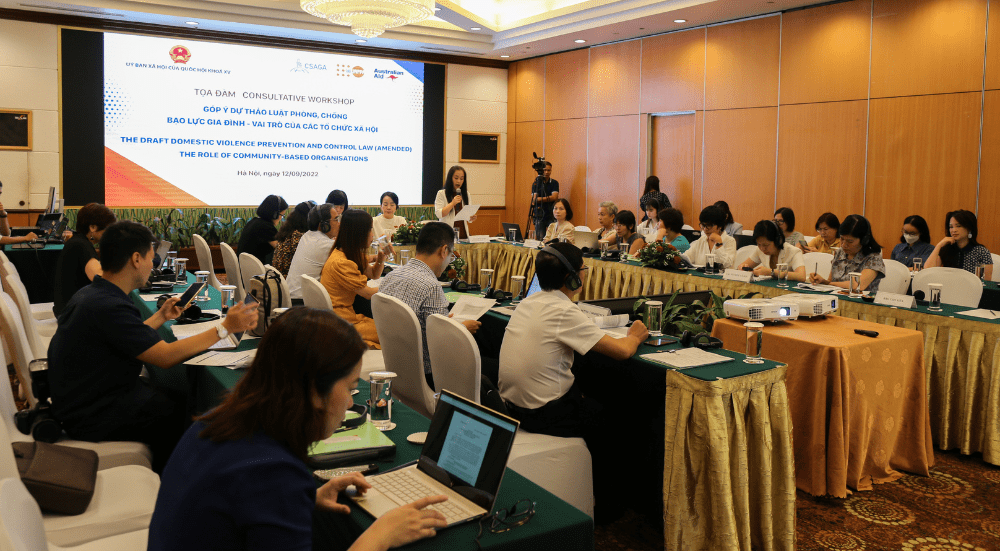Hanoi, 12 September 2022: Representatives from social and community-based organisations today shared with the National Assembly Deputies in Hanoi their activities in addressing domestic violence and discussed mechanism to join forces in tackling domestic violence for Viet Nam.
The discussion was part of the consultative workshop held by the National Assembly’s Committee for Social Affairs in collaboration with the Centre for Studies and Applied Sciences in Gender – Family – Women and Adolescents (CSAGA) to review the draft amended DVPC Law.
High on the agenda of the workshop, which was jointly supported by UNFPA and the Government of Australia, was the presentation by the National Assembly’s Committee for Social Affairs relating to the latest revision of the draft DVPC Law, following the comments by National Assembly in June 2022.
Representatives from the Viet Nam’s GBV Net and CSAGA shared the participants with their experience and best practices in DV prevention and control, especially innovative communications activities to raise public awareness and to address DV.
The participants also heard international experiences in a video message shared by Ambassadors and Heads of Delegations in Hanoi, including Australia, Canada, EU, Spain, Sweden, and the UN.
Addressing the forum, Ms, Nguyen Thi Kim Thuy, Vice Chairwoman of the National Assembly’s Committee for Social Affairs said: “We acknowledged the information and experience shared at the workshop today, including international experience and best practices in addressing domestic violence, especially from Australia with the highlight of the mechanisms of engaging social organisations in delivering services as well as the development of specialist courts for domestic violence, and the evidence-based policy development.”
The current Law on Domestic Violence Prevention and Control was approved by the 12th National Assembly on November 21, 2007, and took effect on July 1, 2008. However, the National Study on violence against women in Vietnam in 2019, which was conducted by Viet Nam’s General Statistical Office and MOLISA, with support from Australia and UNFPA, showed little change in violence against women since the 1st study in 2010. In particular, 62.9 percent of women in Vietnam experienced at least one form of physical, economic, emotional, and/or sexual violence and controlling behaviours in their life time. In addition, 90.4 percent of survivors of violence did not seek any help from authorities, while half of them never told anyone about the violence. Thus, domestic violence is hidden in society, and it is an alarming issue.
In this context, it is high time to strengthen the 2007 DVPC Law. Since October 2021, when the first draft of the Domestic Violence Prevention and Control Law was released for feedback from the public, many technical meetings and consultative workshops were organised by the Ministry of Culture, Sports and Tourism to discuss options, share experience from other countries, and debate the best alternative to take for Viet Nam.
The amendment also focused on the provision of essential and integrated services for DV survivors. It requested the relevant stakeholders to pay further attention and provide financial and technical resources during the Law implementation.
After the amended DVPC Law was elaborated during the 3rd plenary session of the 15th National Assembly in June, the Ministry of Culture, Sports and Tourism and National Assembly Committee for Social Affairs have incorporated all the feedback and comments and finalised the latest draft version with 56 articles.
As part of its efforts to continue to get feedback and comments from the local authorities of the Northern and central provinces and cities in Vietnam, the Ministry of Culture, Sports and Tourism in collaboration with the National Assembly Committee for Social Affairs will organise two more consultative meetings in Vinh Phuc and Nha Trang in coming weeks.
UNFPA has been working very closely with MoCST during the revision process, providing technical and financial support to incorporate recommendations from different studies and ensure international standards and commitments on the prevention and response to domestic violence.
In her opening remarks, the UNFPA Representative for Viet Nam, Ms. Naomi Kitahara stressed: “UNFPA is very glad to see that the revised Law on Domestic Violence Prevention and Control has been based on a human rights approach, incorporating international lessons, and good practices. We have recommended to strengthen the effectiveness of state institutions, while creating favourable conditions for community-based organisations and non-governmental organisations to contribute to the implementation of policies and programmatic interventions to tackle domestic violence in Vietnam. The survivor–centred approach has been applied to ensure the rights of domestic violence survivors, and their needs and voices have been taken into account seriously. This was important especially in the context of Viet Nam where violence against women is mostly hidden.”
For her part, Ms Nguyen Van Anh, Founding Chairwoman - Director of CSAGA said: “I was very honoured to join the discussion during the development of the 2007 Law on Domestic Violence Prevention and Control as a representative of social organisations. And now I’m very glad that I’m able to contribute to the amendment of this Law. In the past 15 years, social organisations and non-governmental organisations made a lot of positive contributions to the Government’s efforts to end domestic violence. With the revision of the current Law, favourable conditions can be created for social and community-based organisations to be fully engaged in the Government’s programmes to prevent and control domestic violence. We trust that our perspectives shared at this workshop will be considered and incorporated in the draft amended Law on Domestic Violence Prevention and Control in order to promote community-based activities in the coming years.”
The DVPC Law (amended) is expected to be approved by the NA XV at its 4th plenary session in October 2022.
For further information contact:
CSAGA:
Nguyễn Tuyết Trinh, Project Coordinator: email: trinhnt@csaga.org.vn; Mobile: 0932241490
UNFPA Viet Nam:
Dinh Thu Huong, Communications Consultant: email: dhuong@unfpa.org; Mobile: 0913301539



